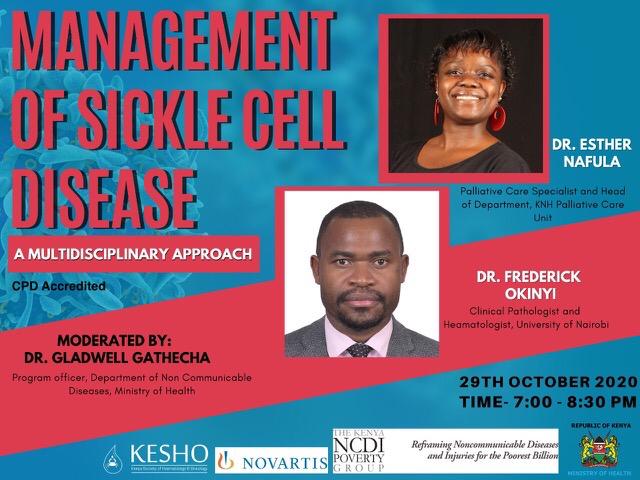
- This event has passed.
Management Of Sickle Cell Disease: A Multidisciplinary Approach
Event Navigation

Moderator: Dr. Gladwell Gatheca Sponsor: Novartis Presenters:
- Dr. Fredrick Okinyi, Lecturer, hematologist, University of Nairobi, Kenya
- Dr. Esther Nafula, Palliative Care Specialist and Head of Department, KNH Palliative Care Unit
Sickle cell disease (SCD) is a neglected genetic disease in sub-Saharan Africa that is responsible for 5-16% of mortality in children under 5 years. Approximately 75% of children die before 5 years of age. SCD has a mortality rate of 58/1000 cases per year. The goals of clinical assessment in to give an impression and confirm the diagnosis in new patients, to determine the symptomatology, acute or chronic complications, stable or unstable in known cases, to classify the type of crisis and precipitating factors in acutely sick patients, to decide on the level of care as outpatient/inpatient or referral. Diagnosis for new patients is based on clinical presentation, family history, clinical features (signs and symptoms), and laboratory testing which can be considered as neonatal screening. Preliminary laboratory tests include full blood counts, reticulocyte counts, blood film morphology. Sickling tests can be easily performed in the laboratory of lower-level facilities. Since the test is positive for individuals with sickle cell disease as well as in sickle cell trait, a Hb separation technique is necessary for a positive test. Confirmatory tests include hemoglobin electrophoresis (HE), High-performance Liquid Chromatography (HPLC), and Isoelectric Focusing (IEF). The point of care rapid tests has high specificity and sensitivity when compared with the HPLC. They are useful in lower-level facilities. Although rapid tests can identify the hemoglobins Hb A, Hb S, and Hb C, they cannot quantify the different hemoglobins or accurately identify some of the other forms of SCD such as Hb S beta-thalassemia. SCD patients should attend clinics as an outpatient management practice. Acute complications should be managed. Fluid management is an important aspect since SCD patients are at risk of dehydration due to impaired renal concentrating power and poor fluid intake. Simple transfusion may use packed red blood cells, where the donor hematocrit should be about 0.6. Exchange transfusion may be undertaken to rapidly reduce the percentage of sickle cells in circulation, especially in severe sickle chest syndrome. The complications of the sickle cell disease range from mild to severe and vary among individuals. Counseling is very important in pre-marital, early childhood, Adolescence/ adulthood, and end of life. Pain management involves the use of strong opioids for severe pain, weak opioids for moderate pain, and regular paracetamols. SCD is incurable often leading to premature death. The patients should be helped to achieve a good death, mainly through control of pain and other physical symptoms, accepting death is inevitable, forgiving others, reconciling with self, family, and God, and being in control of the dying process.
Webinar Recording